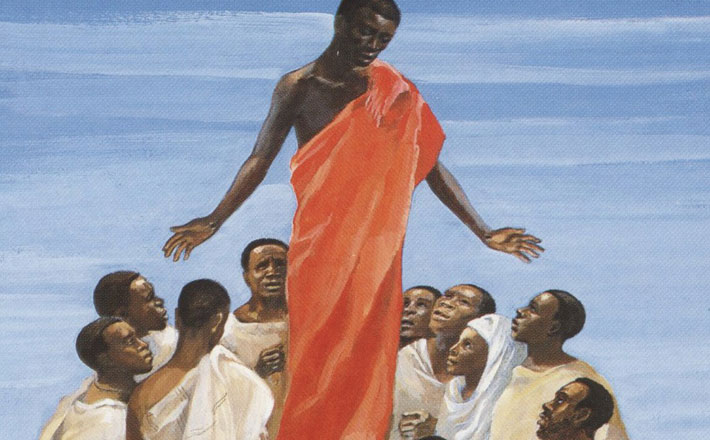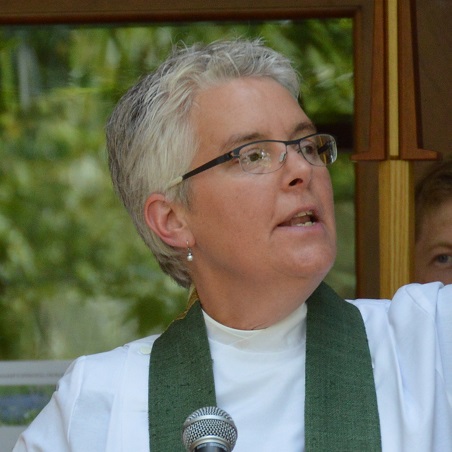Commentary on Matthew 28:16-20
Resurrection leads to commissioning, for Jesus’ resurrection is not the end of his mission, but rather inaugurates a fuller realization of it. For his disciples, this means that, as much as they failed Jesus during his passion, their call to follow him is now renewed and expanded.
The disciples’ meeting with Jesus on the mountain in Galilee is their first appearance since they fled at his arrest. That they believed the women’s testimony that Jesus had been raised and heeded their instructions to go to Galilee to meet him suggests that the disciples are more trustworthy than they had been, but they are still a fragile group. The mention of the “eleven” is a reminder of Judas’ betrayal of Jesus, and the fact that the disciples worship him but also doubt is a further sign of their frailty. This combination of worship and doubt is thematic for Matthew; the disciples are often portrayed as having “little faith,” (Matthew 14:32), wavering between conviction and hesitation. Unlike with Thomas (John 20:24-29) or the disciples in Luke (24:36-43), Jesus does not try to overcome their doubt. As with the women in Matthew 28:9-10, Jesus treats his meeting with them as a normal occurrence and wants to get straight down to business.
It is striking how many times the word “all” is used in this passage: “all authority” has been given to Jesus, he commands them to make disciples of “all nations,” to teach them “everything” he has commanded them, and reassures them that he is with them “always.” These sweeping “alls” indicate how comprehensively the resurrection has transformed the world; now it is time for the disciples to act in response to this changed reality.
The resurrection means that Jesus’ Lordship is now absolute, extending over everything. At the outset of his ministry, Jesus rejected the devil’s offer of lordship over all the kingdoms of the earth (Matthew 4:8). Now this lordship has been granted him, but as unlimited as his authority is, it is not the kind of dominion the devil offered, which was pursued and enforced by violence. Instead, it is the authority of the crucified one, who rejects the power of the sword. (26:52)
Jesus’ universal lordship means that therefore the disciples are commissioned to go make disciples of all nations. This command to extend the Gospel to Gentiles is presaged in the beginning of Matthew’s Gospel, when the magi come to pay homage to the infant Jesus (Matthew 2:1-12), and later when Jesus heals the centurion’s servant (8:10), and the Canaanite woman’s daughter (15:21-28). Now that Jesus is risen, these suggestions of a mission beyond Israel are to be fully realized. The Acts of the Apostles portrays how mind-boggling this expansion is, and how difficult it is for the disciples to fathom it; but here in Matthew it is stated as a self-evident command, growing naturally out of the risen Christ’s lordship over all of heaven and earth.
The disciples’ mission is to make disciples and baptize them, but more than this, to “teach them all I have commanded you.” Matthew portrays Jesus as the consummate teacher, and during his earthly ministry he is the disciples’ only teacher: “you are not to be called ‘teacher,’ because you have one teacher, and you are all students” (Matthew 23:8). When Jesus sends the disciples out in mission they are given authority to cast out demons and perform healings and even raise the dead, but not to teach (10:7-8). Only now, in this post-resurrection commissioning, are they both allowed and commanded to teach.
Teaching supersedes in importance even their earlier miracle-working because in teaching they are conveying what Jesus the true teacher commanded and taught, teachings such as those found in the Sermon on the Mount, and in the command to love God and neighbor. More even than signs and wonders, the greatest gift Jesus offers are his teachings, and so it is these that the disciples are to convey to all nations. In contrast to the commissionings in Luke and John, in which Jesus bestows the Holy Spirit, here what Jesus gives to guide and empower his disciples is simply himself, and all that he taught and commanded.
One reason why Jesus does not bestow his Spirit on the disciples is because the Spirit, in Luke and John’s Gospels, is a parting gift to keep the church connected to Christ even after his ascension, his departure. In Matthew, however, Jesus does not leave the disciples. In contrast, his final words are a promise of his ongoing presence: “I am with you always, even to the end of the age.” This promise fulfills the prophecy given before his birth, that he would be Emmanuel, God with us (Matthew 1:23). The closing words of this Gospel signal that even crucifixion cannot annul that promise, and even resurrection does not separate Jesus from his followers.
Matthew’s “Great Commission” has been viewed as the mission statement of the Church. In contemporary times, when we seek to detach the Church’s missionary work from colonialism and imperialism, and to honor the truth claims of other world religions, it can be difficult to whole-heartedly embrace this commission to “make disciples of all nations.” However, it is important to remember the Matthean nuances of this commission. First, the lordship of Jesus which authorizes this commission is not that of armies and force but is the authority of the crucified one. Second, making converts is not the goal of this commission per se, but rather teaching new disciples to live according to Jesus’ commands, such as those in the Sermon on the Mount that forbid violence or retribution, and that are summed up in the command to love neighbor as oneself. These commands are taught not only in words but by the deeds of Jesus’ missionaries, who convey Jesus’ commands by living them.
In doing the work of Christian mission it is vital to remember that Jesus commissions us even in the midst of our doubts. Even as those with “little faith” we can do his work in the world, and this is because he has promised to be with us always, “even to the end of the age.”
PRAYER OF THE DAY
God of action, you sent your disciples into the world to preach, teach, and make disciples of all nations. Make us instruments of proclamation, so that all might know of the love you have for humanity. We pray these things in the name of Jesus Christ, our Savior and Lord. Amen.
HYMNS
Listen, God is calling ELW 513
Send me, Jesus ELW 549
Lord, you give the great commission ELW 579
We walk by faith ELW 635, H82 209
CHORAL
Go ye into all the world, Don Besig and Nancy Price


April 16, 2023